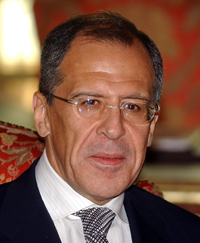Russian foreign minister calls to solve Iran standoff without violence
Russia's foreign minister called on Tuesday for political and diplomatic means to solve the Iranian nuclear problem, as key European nations prepared to fine-tune a package of rewards and penalties meant to entice Tehran to abandon uranium enrichment. The proposal was being discussed by the five permanent members of the U.N. security Council plus Germany and will have to be approved by the Security Council, where the U.S., France and Britain are pitted against Russia and China on how to handle Iran's nuclear ambitions.

"We believe that now we have to concentrate on making sure, all of us, all six countries who are participating in the negotiations, that nothing fails," Russian Foreign Minister Sergey Lavrov said on Tuesday at the end of a two-day visit to Kuwait. The Security Council nations and Germany must "manage to collectively work together, firmly but constructively, to negotiate a solution," Lavrov said. He said that Moscow does not, in principle, consider the use of force in international relations as "a means that can guarantee permanent solutions to crises."
Lavrov added that he hoped Iran would accept the negotiated proposals. "It is important ... that Tehran takes a constructive position," he said. The Russian foreign minister, who then flew to Qatar for bilateral talks, said his country welcomed "all initiatives in this regard (including) those that come from the Gulf Cooperation Council."
His comments came as Iran was at the top of the agenda in a flurry of meetings held this week between Gulf ministers and their Russian and German counterparts. Officials from the Gulf Cooperation Council, a group of the region's Arab countries, said the GCC could send a delegation to Tehran to help resolve the dispute over the Islamic Republic's nuclear program.
Arab nations in the Gulf have, for the most part, remained on the sidelines of Iran's confrontation with the West, though officials have been increasingly vocal about their own concerns about Tehran's nuclear program. They worry about pollution should Iran suffer a nuclear accident, and possible Iranian retaliation against American military bases in Kuwait, Qatar and Bahrain should the U.S. launch a pre-emptive strike, reports the AP.
N.U.
Subscribe to Pravda.Ru Telegram channel, Facebook, RSS!




